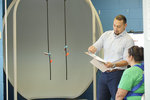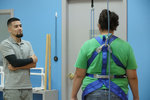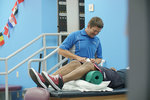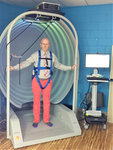Wind: 8.1 mph, W
Welcome to our new web site!
To give our readers a chance to experience all that our new website has to offer, we have made all content freely avaiable, through October 1, 2018.
During this time, print and digital subscribers will not need to log in to view our stories or e-editions.






When Denise Campbell opened Southwest Sport and Spine Center (SSSC) in Las Cruces May 1, 2000, the staff was comprised of herself (a licensed physical therapist) and an office manager. Today, as SSSC celebrates its 22nd anniversary, the company has three clinics in Las Cruces and El Paso as part of the nationwide Fyzical Therapy & Balance Center (FTBC) franchise and 80 employees.
At clinics in Las Cruces and El Paso, SSSC staff provide medical and scientific-based physical therapy and fitness and are on the cutting edge in the study and treatment of balance and breathing issues that are at the core of good health.
SSSC specializes in orthopedic and post-surgical therapy, aquatic therapy, work injury management,
athletic training and performance enhancement (neuromusculoskeletal), vestibular rehabilitation (inner ear issues like balance and dizziness), chronic pain management, concussions and temporomandibular joint disorders (TMJ and TMD) of the jaw and face.
“Clinic balance technology is used to measure reaction strategies for NMSU athletes,” said SSSC Director of Sports Medicine David Gallegos. “This helps provide insight into performance needs and baselines to measure return to normal after injuries."
Since becoming a part of the FTBC franchise in 2017, SSSC has become a primary care provider for musculoskeletal disorders, which include tendinitis, carpal tunnel syndrome, arthritis, fibromyalgia and recovery from bone fractures.
SSSC is also “one of the highest-level” balance centers in the Southwest, Campbell said, and has one of only 50 computerized dynamic posturography (CDP) machines in the United States.
CDP measures how well a patient can maintain balance under different conditions. It can help pinpoint which area of the body is taking the lead (usually the eyes, which can weaken with age) in maintaining balance and which areas need to be strengthened, Campbell said. It can detect inner-ear, vision, joint and flexibility issues that could contribute to balance, falls and injuries, she said.
In many cases, she said, issues can be reversed within a few weeks using simple exercises that the patient can do at home.
Using special light-blocking goggles, SSSC can detect benign paroxysmal positional vertigo (BPPV), which causes dizziness, vertigo (spinning sensation), loss of balance and nausea, Campbell said, and can often be corrected in two to three clinic visits.
Aquatic therapy is available to treat injuries and health issues like strokes, arthritis and recent surgeries for which weight-bearing exercises are not practical.
With major scientific advances in the last decade, physical therapy and fitness are about the whole person, Campbell said, including heart-rate variability, the autonomic nervous system, the immune system, carbon dioxide levels and brain chemistry.
SSSC staff are doing work in breathing science that is not going on anywhere else in the country, Campbell said.
SSSC breathing technician Paola Quiroz not only helps patients deal with a wide range of health issues by improving their breathing, she also is teaching diaphragmatic breathing techniques to members of her own family – and they are helping the 22-year-old deal with the knee and hip issues she has had for the past nine years.
“For me, it’s literally life-changing,” Quiroz said. “It has opened my eyes to so many other aspects of being a health care worker.”
“There’s a lot you can do, and we can guide you,” she said.
Every patient who needs it will get a treatment plan to address whatever issues an initial evaluation discloses. A payment plan can also be created, although some Medicare and Medicaid patients may have to pay nothing for the treatment they receive.
Campbell said her clients include middle-school athletes as young as 12. Others have been with her since SSSC first opened its doors.
A native of southeast Texas, Campbell was a four-sport athlete in high school. A dislocated knee got her interested in physical therapy, which she has been doing her entire adult life “in a way that I knew could help people.” Campbell’s work has included helping professional athletes around the world recover from everything from concussions to knee injuries.
Campbell and her husband, John, made the decision to keep their business in Las Cruces and offer services that are generally available only in larger cities.
“You have to bloom where you are planted,” Campbell said.
Her advice to busy people taking care of families, jobs and homes: “Spend time on yourself.” It is easier to not lose it (good health) then lose it completely and never get it back,” she said.
SSSC has FTBC clinics at 1181 Mall Drive (13,000 square feet) and 2404 S. Locust St. (12,000 sq. ft.), in Las Cruces and 1845 Northwestern Drive (5,000 sq. ft.) in El Paso.
Call 575-522-0766 and 575-521-4188.
Visit https://swsportandspine.com/, www.fyzical.com/mall-drive-las-cruces-nm and www.fyzical.com/locust-las-cruces-nm.
Other items that may interest you
